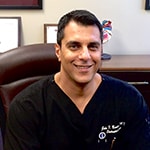What is a Stress Test?
An exercise stress test involves ECG monitoring to see how the heart handles physical activity. An ECG measures the heart’s electrical activity, including how long it takes for the electrical signal to travel throughout the heart’s chambers (triggering a heartbeat) and how strong that signal is. During an exercise stress test, this activity is measured to determine how well the heart adapts to “work” as well as determine the level of activity that is appropriate for a patient to engage in.
Why Get a Stress Test?
A stress test is done for a number of reasons when patients are experiencing cardiac symptoms, especially during physical activity. A traditional ECG measures the heart for several seconds at a resting state. However, the exercise stress test can give even more information, showing how the heart handles needing to pump more blood and determining if the blood supply in the arteries is reduced. The stress test is an essential part of diagnosing certain conditions like coronary artery disease and other potentially dangerous heart conditions, including a heart attack.
When is a Stress Test Needed?
Dr. Beshai might start with a traditional ECG and then recommend a stress test for further monitoring. The stress test is used when you experience symptoms such as:
- Chest pain
- Shortness of breath
- Lightheadedness
Aside from helping Dr. Beshai understand the cause of these symptoms and your risk for a heart attack, the stress test can also be used during treatment to determine its effectiveness. A stress test can also be performed to help determine a safe level of exercise for you to engage in, depending on the results and how you feel throughout the test.
Have Inquiries About Our Services?
How is a Stress Test Performed?
During an exercise stress test, you will be hooked up to special equipment for measuring the heart’s activity. This involves sensors over the chest, arms, and legs to record the electrical signals that trigger the heartbeat. You will then be asked to stand on the treadmill, walking slowly as the speed is gradually increased. The treadmill may also be tilted for an uphill effect to make the heart work harder.
During the test, you’ll be asked to breathe into a tube to measure how much oxygen you’re getting during exercise. The test will continue until a target heart rate is reached but will stop right away if you experience symptoms such as chest pain, severe shortness of breath, abnormally high or low blood pressure, dizziness, or extreme fatigue. Once the exercise portion of the test is over, you will be asked to return to standing, then sitting or lying down to measure how the heart and breathing return to normal. The test can take about an hour to complete.
What are the Next Steps After a Stress Test?
After your stress test, the results of your heart activity, blood pressure, and breathing are analyzed and gone over with you. If everything is normal, no further testing may be necessary. If abnormalities are detected with the stress test such as signs of coronary artery disease or arrhythmia, Dr. Beshai will use this information to develop your treatment plan.
Schedule Your Exercise Stress Test Consultation
Dr. Beshai uses the exercise stress test as an important diagnostic test that can detect abnormalities in the heart rhythm, blood pressure, and breathing. When it comes to the heart, early screening and monitoring are essential, even if symptoms have not occurred yet. If you think you could benefit from a stress test, contact the Heart Rhythm Institute of Arizona to meet with Dr. Beshai, an experienced cardiac electrophysiologist, by calling our office or filling out our online form.
The Heart Institute of Arizona has a wide array of services that come with our premium care. From in-office dianostics and treatable conditions, to hospital based procedures, we’ve got your heart covered.
Dr. Beshai is a board-certified electrophysiologist internationally renowned and respected for his expertise and research. Having published in major medical journals and travelled all over the world to present research, he is dedicated to providing innovative, state-of-the-art care to his patients.
- John F. Beshai, MDhttps://heartbeataz.com/author/heartbeata/
- John F. Beshai, MDhttps://heartbeataz.com/author/heartbeata/
- John F. Beshai, MDhttps://heartbeataz.com/author/heartbeata/
- John F. Beshai, MDhttps://heartbeataz.com/author/heartbeata/

